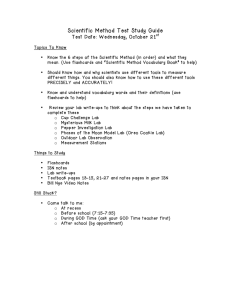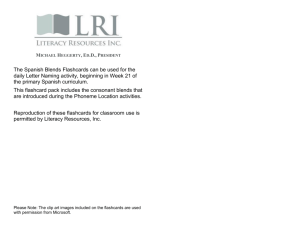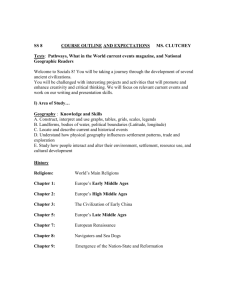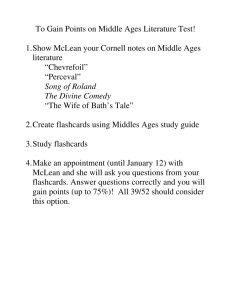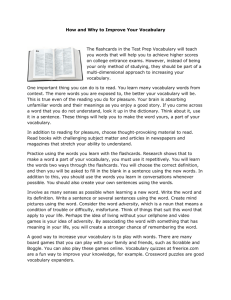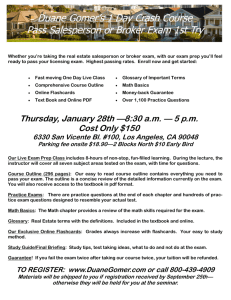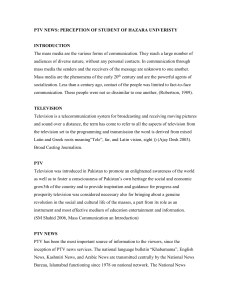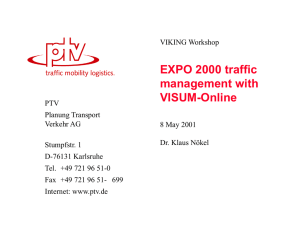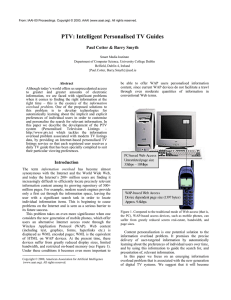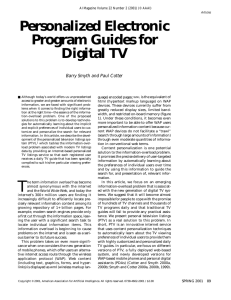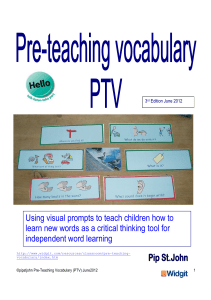- ESL101.com
advertisement
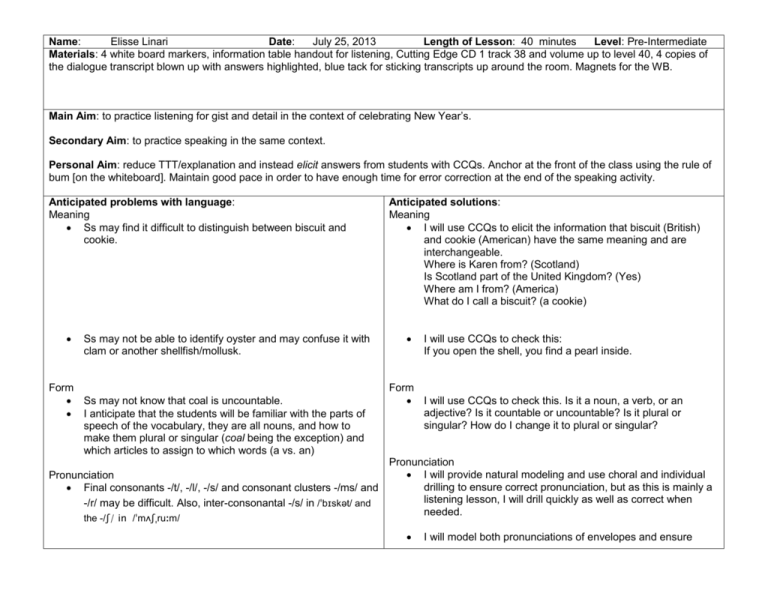
Name: Elisse Linari Date: July 25, 2013 Length of Lesson: 40 minutes Level: Pre-Intermediate Materials: 4 white board markers, information table handout for listening, Cutting Edge CD 1 track 38 and volume up to level 40, 4 copies of the dialogue transcript blown up with answers highlighted, blue tack for sticking transcripts up around the room. Magnets for the WB. Main Aim: to practice listening for gist and detail in the context of celebrating New Year’s. Secondary Aim: to practice speaking in the same context. Personal Aim: reduce TTT/explanation and instead elicit answers from students with CCQs. Anchor at the front of the class using the rule of bum [on the whiteboard]. Maintain good pace in order to have enough time for error correction at the end of the speaking activity. Anticipated problems with language: Meaning Ss may find it difficult to distinguish between biscuit and cookie. Ss may not be able to identify oyster and may confuse it with clam or another shellfish/mollusk. Form Ss may not know that coal is uncountable. I anticipate that the students will be familiar with the parts of speech of the vocabulary, they are all nouns, and how to make them plural or singular (coal being the exception) and which articles to assign to which words (a vs. an) Pronunciation Final consonants -/t/, -/l/, -/s/ and consonant clusters -/ms/ and -/r/ may be difficult. Also, inter-consonantal -/s/ in /ˈbɪskət/ and the -/ʃ/ in /ˈmʌʃˌru:m/ Anticipated solutions: Meaning I will use CCQs to elicit the information that biscuit (British) and cookie (American) have the same meaning and are interchangeable. Where is Karen from? (Scotland) Is Scotland part of the United Kingdom? (Yes) Where am I from? (America) What do I call a biscuit? (a cookie) I will use CCQs to check this: If you open the shell, you find a pearl inside. Form I will use CCQs to check this. Is it a noun, a verb, or an adjective? Is it countable or uncountable? Is it plural or singular? How do I change it to plural or singular? Pronunciation I will provide natural modeling and use choral and individual drilling to ensure correct pronunciation, but as this is mainly a listening lesson, I will drill quickly as well as correct when needed. I will model both pronunciations of envelopes and ensure Students may know a different pronunciation of envelope than the one I use. They may not know that it has two different pronunciations. Anticipated problems with texts and tasks: The long dialogues may prove to be problematic The listening task involves a bit of writing. Ss may fall behind if they try to write too much. students know that both are correct. Anticipated solutions: The main aim is listening, so I’ve allowed for extra time in schedule for repeated listenings. I will instruct the students that they do not need to write complete sentences. I will use ICQs to check their understanding, “Do you need to write full sentences or words?” Language Analysis Sheet Language item & meaning Form How meaning will be checked Envelopes: “an enclosing plural noun PTV task: (flashcards) What do you put a card in before you mail it? singular noun PTV task: (flashcards) This is a small sweet treat that you have with tea or coffee. Pronunciation features to be highlighted Ooo cover for a letter, card, etc.” Biscuit: “a sweet baked food that is usually small, flat, and round and is made from flour and sugar.” Coal: “a black or brownish-black hard substance within the earth that is used as a fuel” Mushrooms: ”a fungus that is shaped like an umbrella” Oysters:”a type of shellfish that has a rough shell with two parts and that is eaten both cooked and raw.” /ˈɛnvəˌloʊp, ˈɑ:nvəˌloʊp/ -/p/ final Oo /ˈbɪskət/ inter-consonantal -/s/ O uncountable noun PTV task: (flashcards) You can burn this to heat your house. It comes from a mine /ˈkoʊl/ -/l/ final Oo plural noun PTV task: (flashcards) It turns Mario into Super Mario. It is shaped like an umbrella. It’s a fungus. plural noun PTV task: (flashcards) If you open the shell, you might find a pearl inside. You find it in the sea, you can eat it cooked or raw. All definitions from Merriam-Webster’s Online Learner’s Dictionary: http://www.learnersdictionary.com /ˈmʌʃˌru:m/, -/ʃ/ has been an issue Oo /ˈɔɪstər/ consonant cluster -/st/ and r-colored final vowel. Timing/Int (When? Who) Stage (What?) Stage Aim (Why?) Procedure (How?) 5 mins T→C Lead-in To generate interest in the topic and get students thinking in English. T: introduces self and writes name OB. T: I’m from the USA. Americans celebrate the New Year on December 31st. We usually go to a party and drink champagne. We say 10, 9, 8… to welcome the New Year, and at midnight we kiss someone for good luck! T: With your partner, brainstorm words or ideas about New Year’s celebrations. They can be about Vietnamese celebrations or customs from other countries and cultures. Write down a few words. ICQs: Are you working alone? (No) Are you writing complete sentences? (No) S→S Ss work in pairs and brainstorm. T monitors and notes which groups are struggling to brainstorm. T draws a cloud on the WB with the word New Year’s in the middle. T→C T: Stop. T nominates 4 students to write their ideas/words on the board. OCFB: T checks spelling and remarks on any unique/unusual words. T wipes board clean. 10 mins T→C Ss →T PTV To elicit the meaning of difficult words in the listening activity. T anchors at front of the room. T uses flashcards and CCQs to elicit vocabulary from the students. PTV task: (flashcards) Before you mail a Tutor’s Comments card or letter, you put it in an… PTV task: (flashcards) This is a small baked food that you have with tea or coffee. PTV task: (flashcards) You can burn this to heat your house. PTV task: (flashcards) It turns Mario into Super Mario. PTV task: (flashcards) You find it in the sea. You can eat it cooked or raw. T drills students chorally, then individually T: Predict which person will say which word. What words will Karen say? What words will Johnny say? T: sticks flashcards to whiteboard under the name of the person students predict. 15 mins T→C Listen for details task For the students to practice listening for specific information T instructs: Listen to the following dialogues about New Year’s Celebrations. Fill in the information table with short answers. ICQs: Are you writing full sentences or words? (words) T sits quietly at the CD player. Plays first recording. Ss S→S Ss Ss listen and fill in the table. T: Check your answers with your partner. T plays first recording again. T plays second recording. Ss listen. Check answers with a partner. T plays second recording again. S→S Compare your answers with your partner. T→C T instructs: Around the room are copies of the dialogues you have just heard. The information needed to complete the table is highlighted. Get up and check your answers. Ss T→C Ss check answers from the dialogue transcript. T monitors to see which questions the students had the most difficulty with. Ss T: Stop. Sit down. Open your handouts to see the answer key. 10 mins T→C Communicative For the students to Follow-up practice speaking in the context of the listening activity Ss check answers from answer key. T instructs: Talk to your partner about which things are similar about the New Year’s celebration in the two countries. Which things are different? S→S T monitors and takes notes of errors in Ss utterances. T→C T writes 3-4 utterances OWB Positive feedback and error correction.

